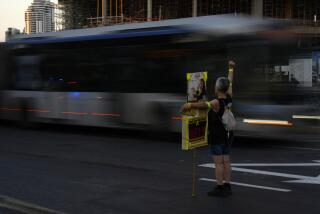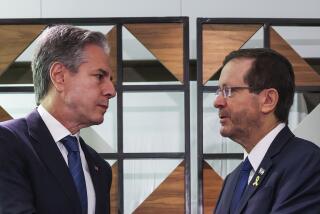U.S. Envoy Gains No Breakthrough in Mideast
JERUSALEM — U.S. peace envoy Dennis B. Ross ended a four-day Mideast shuttle Monday night without securing an agreement from Israel and the Palestinians on a U.S. initiative to restart the deadlocked peace process.
Ross had been trying to get the two sides to accept a U.S. proposal for an Israeli withdrawal in stages from 13% of the West Bank--a pullback that would be accompanied by Palestinian steps to combat terrorism and help safeguard Israel’s security.
Prime Minister Benjamin Netanyahu rejected the 13% pullback and did not commit himself to another figure during a fourth and final meeting with Ross late Monday, before the U.S. mediator headed back to Washington.
In Washington, State Department spokesman James P. Rubin said the peace process “is in dire straits,” and brought up the possibility that the U.S. could abandon its mediating role.
“One option has always been for us to disengage from this kind of direct catalytic role. But it’s not an option that [Secretary of State Madeleine Albright] is advocating or an option that we would like to see happen at all.”
Netanyahu spokesman David Bar-Illan said, however, that talks with the United States and the Palestinians will continue and that there had been movement toward resolving the yearlong stalemate.
“There’s no deal, but I know treading water and real progress, and there was real progress,” Bar-Illan said. “It is fair to say that Israel is not willing to go 13%, but we might be willing to find a creative solution.”
Palestinian Authority President Yasser Arafat left for a scheduled trip to the Netherlands early Monday without giving his approval to the U.S. proposal, but sources close to the negotiations said he seemed inclined to accept it if he could be sure that Israel would implement such an agreement.
“Basically, he doesn’t like the package because he thinks it is closer to Israel’s position, but given all [of the problems] going on between the United States and Israel, he would like to say yes,” said one source, who asked not to be identified.
“On the Israeli side, they don’t like a number of things, particularly the size of the further redeployment. And they are insisting on the concept of reciprocity, whereas the American approach is to talk about parallel actions, not conditionality,” this source said.
U.S. officials have declined to give details of the American proposal or specifics of the negotiations. Israeli media have reported that the United States is promoting a 13.1% withdrawal that would take place in three stages over 12 weeks, while the Palestinians would ban incitement to violence in the self-rule areas, ratify changes in the Palestine Liberation Organization covenant that would eliminate clauses calling for the destruction of Israel, and give Israel a complete accounting of the number of Palestinian police and security forces.
Netanyahu denied media reports Monday that a compromise was emerging in which he would agree to an 11% pullback--up from the 9% he has previously said is the most Israel can offer.
Bar-Illan said the Monday night meeting was about “concepts rather than specifics on the question of numbers.” He said Israel is concentrating “on what we need to get the Cabinet and Knesset [parliament] to support the prime minister’s moves. We need definite, concrete, measurable steps on the part of the Palestinians that can be measured and verified.”
Netanyahu agreed to a U.S.-backed deal last year to carry out three troop pullbacks by this summer. But, following terrorist attacks, he said he would go ahead with only one withdrawal before moving to negotiations for a final peace agreement.
Far-right members of Netanyahu’s coalition have threatened to pull out of the government if he undertakes another pullback from the West Bank lands Israel captured during the 1967 Six-Day War, but U.S. officials say they believe he can overcome such pressure.
“He is well positioned to take on the right wing if he so chooses,” said a U.S. official who declined to be identified.
*
Infrastructure Minister Ariel Sharon, who opposes a pullback of greater than 9%, boycotted the evening meeting with Ross, Netanyahu and Defense Minister Yitzhak Mordechai.
Sharon also opposed Netanyahu’s decision last year to withdraw from most of the West Bank city of Hebron, but the Cabinet and Knesset approved that deal.
Ross was to return to Washington overnight to brief Albright and, later in the week, President Clinton on the results of his mission. He is expected to make another trip to the Mideast in the coming weeks.
In the West Bank, Palestinians chanting “Death to America!” stoned Israeli troops and burned U.S. and Israeli flags in anger over the deadlocked peace talks.
Israeli troops fired tear gas and metal pellets to disperse hundreds of protesters in the West Bank towns of Bethlehem, Al Birah and Ramallah. Several Palestinians were injured.
Palestinian police, meanwhile, detained several supporters of the Islamic militant group Hamas for questioning in connection with the explosion of a car bomb reportedly made of 110 pounds of TNT. The car bomb, apparently intended for use in an attack in Israel, went off prematurely Sunday in an industrial zone of Ramallah, killing a Palestinian.
More to Read
Sign up for Essential California
The most important California stories and recommendations in your inbox every morning.
You may occasionally receive promotional content from the Los Angeles Times.









